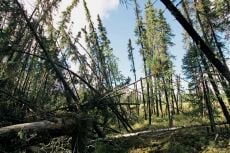Popular Science has an article on its website examining the effects of thawing permafrost in the Arctic. New research reveals that the melting ice does not just have localized effects on towns in places like Alaska and Scandinavia, which are sinking as the ice beneath them melts. In addition, vast amounts of greenhouse gases currently stored in the permafrost could be released into the atmosphere, making the thawing ice a problem with global ramifications.
One somewhat counterintuitive point the article makes is that an increase in the number of trees on the Arctic tundra thanks to warmer temperatures and better growing conditions could actually serve to accelerate global warming. While trees are normally thought of as a check against global warming, since they store carbon dioxide and release oxygen, in this case, more trees mean increased melting of the permafrost. Previously, snow would cover the low-lying moss and lichen and reflect nearly 90% of sunlight away from earth due to the albedo effect. Tall trees, on the other hand, are not so easily covered by snow. Consequently, their dark, exposed leaves absorb sunlight, warming the ground and thawing the permafrost below.
Yet even trees are not immune to the negative effects of thawing permafrost. While they may increase in number, many trees can no longer stand upright in the mushy ice, resulting in a phenomenon known to Alaskans as “drunken trees” — just another bizarre scene in the topsy-turvy world of the Arctic where polar bears drown and Iceland wants to join the E.U.

Drunken Trees. Credit A. Cooper/Alamy, from Popular Science online.